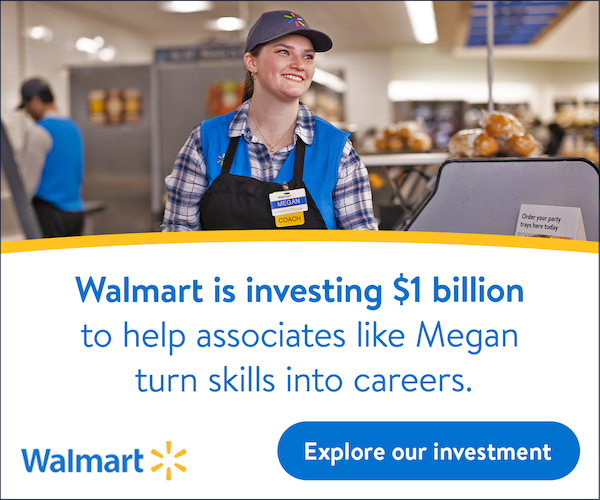The Archive
Every issue of the Punchbowl News newsletter, including our special editions, right here at your fingertips.
Join the community, and get the morning edition delivered straight to your inbox.
When Sarah started working at Walmart, she thought she needed a degree to be a manager. Now? “I know I can do it. I believe in myself,” she says. Walmart is investing $1 billion in career-driven training and development to help prepare associates like Sarah for their careers. Learn more.
PRESENTED BY

Thank you so much for joining our Punchbowl News event at the U.S. Conference of Mayors’ 91st Winter Meeting with Durham Mayor Elaine O’Neal yesterday.
O’Neal joined us to discuss the nation’s housing crisis, working across the aisle and gentrification. The conversation was presented by Fidelity Investments.
Watch our full conversation here.

Here are our key takeaways from the conversation with Mayor O’Neal:
| → | O’Neal emphasized the importance of local partnerships when it comes to building new homes, arguing that mayors and other officials could not address housing alone. |
Prior to becoming mayor, O’Neal was a judge in North Carolina. One of the first lessons she learned in her new job, she said, was that just being mayor wasn’t enough to convince all the players to get involved, even with the support of city council. It’s a complex issue that takes time and trust from local businesses to make meaningful progress.
“I did not realize the interplay of city, state and the federal level. … One of the difficult things, when you’re sitting in the mayor’s seat – we’re not responsible, we don’t build housing. We have to partner with people. So it’s very important that you begin to build those partnerships as you’re actually helping to build housing.”
| → | O’Neal said she believed that some lawmakers in Washington had forgotten “who they are working for,” and that Congress had gotten less done for Americans as a result. |
The North Carolina Democrat added that some partisan squabbling over policy was perfectly fine. But on basic issues – such as providing health care and housing – policymakers at the federal level have spent too much time bickering.
In the 117th Congress, former House Financial Services Chair Maxine Waters (D-Calif.) repeatedly pushed a housing reform package that would have directed $150 billion in federal funds toward the long-running American housing shortage.
But that initiative was squashed by Sen. Joe Manchin (D-W.V.) amid negotiations around the Build Back Better agenda and the eventual Inflation Reduction Act.
Here’s more from O’Neal:
“One of the things I would like for our representatives [in Washington] to do is remember who they are working for – that is, the general public. There are lots of things you can argue about, granted; that’s part of our democracy. But there are some basic things that people should not argue about, and that’s providing housing, providing health care.”
| → | Gentrification is threatening the fabric of life in Durham, O’Neal said, pointing to city workers struggling to live in the area they serve. |
The rising costs from the last few years’ inflation spike hasn’t helped, either. And while gentrification has historically been concentrated in the country’s largest cities, smaller municipalities have increasingly been impacted as well.
Here’s what O’Neal said:
“The poor are getting poor. Middle class America is getting poorer. And it saddens me when I think about our police officers and our first responders, those of bus drivers and all of those folks … having problems living in Durham, North Carolina. Now what does it look like for a city to have its workers who are making the city [work] every day, and they can’t afford to live there?”
| → | O’Neal said if a city wants to improve the lives of people in marginalized communities, policymakers need to bring them into the process too. |
Since becoming mayor in 2021, O’Neal said she had reached out to individuals she’d known from within the justice system during her prior experience in the legal system. O’Neal asked for their feedback as her team developed policies to address economic inequality and opportunity.
More:
“It’s important that those voices are sitting at the table. One of the things I ran on was that those closest to the pain need to be close to the power, and they have to be sitting at the table.
“I have invited some of the young people that I’ve dealt with as a judge to sit at those tables and to help us develop things that will help them to become a part of middle America.”
Takeaways from Pamela Everhart, SVP and head of regional public affairs and community relations at Fidelity Investments

We also heard from Fidelity Investments’ Pamela Everhart, a senior vice president and head of regional public affairs and community relations, who detailed a new $250 million program directed at college students from marginalized communities.
| → | Everhart said that beyond scholarship funding, Fidelity’s program would put a premium on mentorship and guidance for students, as well as access to mental health resources. |
“Money is important, I won’t deny that. Scholarships are great, but that’s not everything. Because you can have the money, but then you may not have the mentoring. You may not have the college coaching.
“The mayor mentioned the mental health piece. That’s so important [with] the stress that students go through today in college.”
| → | Everhart also detailed the kinds of metrics Fidelity would use to evaluate the program’s effectiveness over time. |
Grades and graduation rates would be important, she said, but the investment giant would also track less common factors:
“People say you treasure what you measure. So we will be looking at college completion rates. We will be looking at the number of students who graduate with no debt. We will be looking at internships that these kids get access to, and then if they graduate with good paying jobs.”
Watch the full conversation here.
If you’re not yet a Punchbowl News subscriber, we hope you’ll join the community. Our free morning newsletter comes out Monday through Friday. You can sign up here. We also invite you to consider our Premium community — which includes a midday and evening wrap-up as well as lots of members-only events. Join the community here.
Thanks again for joining!

Crucial Capitol Hill news AM, Midday, and PM—5 times a week
Join a community of some of the most powerful people in Washington and beyond. Exclusive newsmaker events, parties, in-person and virtual briefings and more.
Subscribe to Premium
The Canvass Year-End Report
And what senior aides and downtown figures believe will happen in 2023.
Check it outEvery single issue of Punchbowl News published, all in one place
Visit the archiveWalmart, one of Fortune’s 100 Best Companies to Work For, is investing $1 billion in helping associates grow careers based on their real-life skills. Learn how Walmart is helping associates build careers, with or without a degree.







